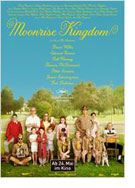

Opening 24 May 2012
Directed by:
Wes Anderson
Writing credits:
Wes Anderson, Roman Coppola
Principal actors:
Jared Gilman, Kara Hayward, Bruce Willis, Edward Norton, Bill Murray
It’s a cross between a Norman Rockwell painting and a page from a Charles Wysocki Americana calendar. We are casual voyeurs peering into the picture-perfect renovated lighthouse named Summer’s End, home to the Bishop family living on New Penzance Island, a remote mythical place somewhere off the coast of New England in the innocent summer days of 1965. We are invited to observe the Bishops, room by room in a dollhouse view, and are captivated. Could this idyllic world be real? Three impeccably behaved young boys are listening to Benjamin Britten’s The Young Person’s Guide to the Orchestra, Op. 34: e A-F on a record player. Mrs. Bishop (Frances McDormand) and Mr. Bishop (Bill Murray) are in separate rooms, mute and unobtrusive, not disturbing their progeny. But wait, the older sister, heavily eye-shadowed twelve-year-old Suzy (Kara Hayward) is sending out ripples that she won’t conform to Bishop family bliss. She is sullenly detached, sitting in the window seat reading books with elaborately decorated covers. Periodically she grabs her binoculars to scan the horizon in search of something, something more than life at Summer’s End can offer her. Wes Anderson, along with co-author Roman Coppola, has created a highly stylized but completely enchanting world and the adventure is just to begin.
It’s a love story, really. A year before at a school pageant Suzy had met Sam (Jared Gilman), also eleven, an orphan, a foster child, and a member of the local Khaki Scout troop. It was love at first sight though she was dressed as a raven and he, with his bookish Harry Potter-like looks, in his Khaki Scout uniform. Both are very bright, social misfits, and restless for life to begin. They had been plotting in letters to run away together for a year now, and secretly meet in a meadow to begin their lives in hiding, camping in Sam’s tent. By running away together, they succeed in transforming the serene world of New Penzance’s adults into a tumultuous frenzy. An upcoming hurricane, announced to us at the film’s beginning by shrunken-duffle-coat-clad Narrator (Bob Balaban), aids them in their quest to turn the idealized New England world of the mid ‘60s literally upside down.
The adults in the movie are mostly loveable but quietly inept. Soft-spoken milquetoast Captain Sharp (Bruce Willis), the only policeman on the island, leads a sad, secret, and solitary life. In his desperation to find Suzy and Sam he deputizes some of the young Khaki Scouts with primitive weapons to carry out the search for the runaways. Boyish Scout Master Ward (Edward Norton) is enthusiastic, highly efficient and an outmoded caricature of what a Scout Master should be. He had taught Sam all the skills of a perfect woodman only to have his protégé escape camp by cutting a hole in his tent and covering the hole with a poster. Mr. and Mrs. Bishop are successful lawyers, drab older parents, and miserable prisoners in an unfulfilling marriage. The dreaded and magnificently costumed Social Services (Tilda Swinton), yes, that is the name of the character, and yes, she has perfected an American accent, is the only one with “balls.” Or so it seems until Scout Master Ward and Captain Sharp each gather up their courage and rescue the young couple from life’s dangers and woes.
If the movie has one flaw, it is that the escaped twelve-year-olds are captured early on and abducted back to the adult world fifty minutes into the movie. The rest of the film could have been anticlimactic, except, do not underestimate either the force of true love or of the hurricane that the elfin Narrator heralded early on. Moonrise Kingdom is the title of the film, and the name lovingly given by Suzy and Sam to the little cove they had escaped to; it doesn’t survive the hurricane. However, the whimsy, the humor, and Wes Anderson’s genius to rekindle nostalgic memories of rebellious youth and first love, makes this movie a heartfelt, timeless, and enduring tale. (Pat Frickey)